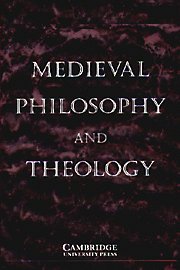No CrossRef data available.
Article contents
Idealism in Medieval Philosophy: The Case of Johannes Scottus Eriugena
Published online by Cambridge University Press: 30 July 2001
Abstract
In this article I wish to re-examine the vexed issue of the possibility of idealism in ancient and medieval philosophy with particular reference to the case of Johannes Scottus Eriugena (c. 800–c. 877), the Irish Neoplatonic Christian philosopher. Both Bernard Williams and Myles Burnyeat have argued that idealism never emerged (and for Burnyeat, could not have emerged) as a genuine philosophical position in antiquity, a claim that has had wide currency in recent years, and now constitutes something of an orthodoxy.1. Myles Burnyeat, “Idealism and Greek Philosophy: What Descartes Saw and Berkeley Missed,” Philosophical Review 91 (1982): 3–40, repr. in Godfrey Vesey, ed., Idealism—Past and Present (Cambridge: Cambridge U.P., 1982), pp. 19–50. Hereafter this essay will be cited in the version printed in Vesey, ed. Richard Sorabji (instancing Gregory of Nyssa) and Werner Beierwaltes (citing Proclus and Eriugena), and Eyjólfur Kjalar Emilsson (discussing Plotinus), on the other hand, have all argued that idealism is to be found in the Neoplatonic tradition, a tradition neglected by Burnyeat.Richard Sorabji, “Gregory of Nyssa: The Origins of Idealism,” in Time, Creation and Continuum. Theories in Antiquity and the Early Middle Ages (London: Duckworth, 1983), pp. 287–96; Werner Beierwaltes, Denken des Einen. Studien zur neuplatonischen Philosophie and ihrer Wirkungsgeschichte (Frankfurt: Klostermann, 1985). See also Beierwaltes, “Die Wiederentdeckung des Eriugena im Deutschen Idealismus,” in Platonismus und Idealismus (Frankfurt: Klostermann, 1972), pp. 188–201, and his “Zur Wirkungsgeschichte Eriugenas im Deutschen Idealismus und danach. Eine kurze, unsystematische Nachlese,” in Eriugena. Grundzüge seines Denkens (Frankfurt: Klostermann, 1994), pp. 313–330. Eyjólfur Kjalar Emilsson, “Cognition and its Object,” in Lloyd P. Gerson, ed., The Cambridge Companion to Plotinus (Cambridge: Cambridge U.P., 1996), pp. 217–49, esp. pp. 245–49. But see, Lloyd P. Gerson, Plotinus (London: Routledge, 1994), p. 227, n.3, who maintains that Plotinus is not an idealist. Similarly, in a 1989 study, I argued not only that idealism was a genuine possibility in late classical and in medieval philosophy, but that that the ninth-century Carolingian philosopher Johannes Eriugena presents a striking example of an extremely radical, almost fantastical, idealism.Dermot Moran, The Philosophy of John Scottus Eriugena. A Study of Idealism in the Middle Ages (Cambridge: Cambridge U.P., 1989). Of course, the whole discussion depends entirely on what is meant by ‘idealism’. Burnyeat uses Berkeley’s immaterialism as his standard for idealism, and it is this decision, coupled with his failure to acknowledge the legacy of German idealism, which prevents him from seeing the classical and medieval roots of idealism more broadly understood.
- Type
- Research Article
- Information
- Copyright
- © 1999 Cambridge University Press




